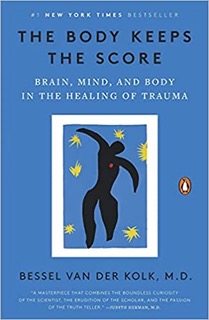Body of Evidence
November 8, 2022
Who could have imagined that a book about the neuroscience of trauma would be on The New York Times best settler list for 153 weeks and counting? For 34 of those weeks, beginning February 14, 2021, renowned trauma expert Bessel van der Kolk’s book, The Body Keeps the Score, was #1 on the list and has sold over 2 million copies.
Perhaps it shouldn’t be a surprise that just short of one year into a global pandemic, a book on trauma became the book of choice for many – and continues to be. What may be surprising is the news that those of us who work with trauma have always known – that the experience of trauma has a direct and profound effect on our bodies. We understand that trauma is so much more than a bad memory. Trauma has a profound and damaging ripple effect on our brains and our bodies, and thus alters the way we experience ourselves and the world in the aftermath of the traumatic event.
A full understanding of how it is that trauma impacts the human body would require a long and complex explanation. Suffice it to say that it is our nervous system, the command system of our bodies, that is most impacted by trauma.
Although the nervous system originates in the brain, it controls the vast majority of both body and brain. The nervous system controls our movements, thoughts, and automatic responses to all of the world around us as well as other body systems such as digestion, breathing and sexual development. Because the nervous system plays a role in nearly every aspect of our health and well-being, it is not an exaggeration to say that trauma takes up residence in the body, affecting nearly every bodily system.
The implications for a child who has been sexually abused are far-reaching and life-altering. Events that happen to us in the course of development shape who we are, how we are, and how we come to know ourselves in the world. Survivors may or may not have clear memories of the abuse because trauma is not primarily stored in our conscious mind, but there is no doubt that the survivor’s body remembers and in effect re-lives the trauma – every single day.
Understanding this sad truth is often reassuring for survivors who have struggled with reactions and sensations that don’t seem to fit the situation or surroundings. A statement I often hear from survivors about their ongoing trauma reactions in their present life is, “It just doesn’t make sense.” Our nervous system, following cues from a long-ago threat, sends out reactions intended to warn of danger but which often cause survivors confusion and even shame in the present. What can feel like a misfired reaction is our body’s way of attempting to keep us safe.
Coming to grips with the reality that trauma lives on in our bodies is certainly a paradigm shift in how we approach helping survivors of trauma to heal. Treatment must move beneath the cognitive mind to heal the parts of survivors that remain frozen in the past. The Body Keeps the Score opens new and direct ways to engage our bodies to aid the healing process.
I believe that the paradigm shift can have even deeper implication. Could it be that we are moving toward seeing suffering human beings as much more than a collection of symptoms to treat? We now have evidence that trauma affects not only, or even primarily, the survivor’s psyche, but lives on in the depths of one’s body. The understanding of how it is that our bodies literally contain trauma invites a view of trauma survivors as individuals who experience the remnants of terrible and scary events day after day. The survivor whose child’s body, psyche, and sexual self were carelessly and selfishly violated deserves nothing less than to be seen as a whole and worthy human being who is capable of healing in mind and body.
With new understanding, we can come to see that our mental health encompasses far more than tending to our mental functioning. As we gain a clearer and more comprehensive understanding of the full impact of the experience of trauma, we can hopefully come to acknowledge and appreciate the depth of struggle that so many of our fellow human travelers experience every day.
For a deeper discussion of this topic listen to Ezra Klein’s excellent interview with Bessel van der Kolk: https://podcasts.apple.com/us/podcast/this-conversation-will-change-how-you-think-about-trauma/id1548604447?i=1000532955898
Janice M. Palm, LMHC
Executive Director
Coming to grips with the reality that trauma lives on in our bodies is certainly a paradigm shift in how we approach helping survivors of trauma to heal.
The survivor whose child’s body, psyche, and sexual self were carelessly and selfishly violated deserves nothing less than to be seen as a whole and worthy human being who is capable of healing in mind and body.
